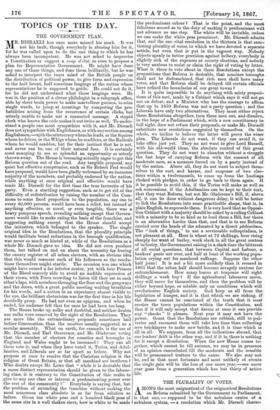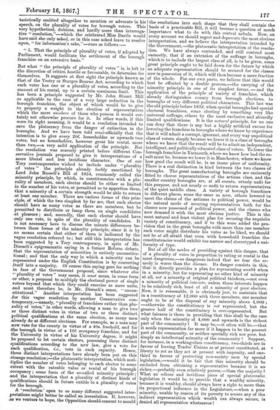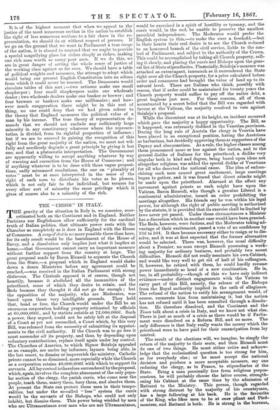THE PLURALITY OF VOTES.
AMONG the most enigmatical of the enigmatical Resolutions on Reform submitted by the Government to Parliament, is that one, — supposed to be the nebulous centre of a nebulous system, — a resolution which Mr. Disraeli charac- teristically omitted altogether to mention or advocate in his speech, on the plurality of votes for borough voters. This very hypothetical, dubious, and hardly more than interroga- tive " resolution,"—which the celebrated Miss Dartle would have said she only asked, or in this case asked leave to resolve upon, "for information's sake,"—runs as follows :-
" 5. That the principle of plurality of votes, if adopted by Parliament, would facilitate the settlement of the borough franchise on an extensive basis."
But what " the principle of plurality of votes " is, is left to the discretion of critics, hostile or favourable, to determine for themselves. It suggests at first sight the principle known as that of the Vestry or Sturges Bourne Act, according to which each voter has one or a plurality of votes, according to the .amount of his rental, up to a certain maximum limit. This las been a principle suggested by Mr. John Stuart Mill as applicable to the case of a very large reduction in the borough franchise, the object of which would be to give to property a weight in the election of representatives which the mere numbers of those who possess it would cer- tainly not otherwise procure for it. In other words, if this mere its right meaning, it would be a resolution intended to save the plutocracy from the danger of extinction in the boroughs. And we have been told semi-officially that the intention is to give every 201. householder or upwards two votes, but no householder, however great his rental, more than two,—a very mild application of the principle. But the resolution was scarcely printed before different Con- servative journals proposed to give it interpretations of a more liberal and less invidious character. One of our Tory contemporaries wished to include under "plurality of -votes " the principle already feebly sanctioned by Lord John Russell's Bill of 1854, commonly called the minority principle, by which, in constituencies with a plu- rality of members, each elector should be either so limited in the number of his votes, or permitted so to apportion them, that a minority of a certain strength would be able to return .at least one member. There are various forms of this prin- ciple, of which the two simplest by far are, that each elector -should have as many votes as there are members, but be permitted to distribute or lump them on single candidates at pleasure ; and, secondly, that each elector should have only one vote, in spite of the plurality of candidates. It is not necessary here to discuss the minute differences be- tween these forms of the minority principle, since it is by no means certain that either of them is indicated by the vague resolution referred to ; but still this interpretation has been suggested by a Tory contemporary, in spite of Mr. Disraeli's epigrammatic saying in a former Reform debate, that the representation of minorities is entirely unconstitu- tional ; and that the only way in which a minority can be .represented under the English Constitution is by converting itself into a majority. Of course this saying goes for nothing in face of the Government proposal, since whatever else " plurality of votes " may mean, it must mean, in some form or other, a proposal to multiply the electoral power of single voters beyond that which they could exercise as mere units, and must therefore be, in Mr. Disraeli's sense, " uncon- stitutional." Another interpretation has been suggested for this vague resolution by another Conservative con- temporary,—namely, "plurality of franchises rather than plu- rality of votes," in other words, allowing a man to give two or three distinct votes in virtue of two or three distinct political qualifications at the same election, as many men .already do at different elections. For example, as a man may .now vote for the county in virtue of a 40s. freehold, and for the borough in virtue of a 10/. occupancy franchise, and for the University in virtue of his University degree, it might be proposed to let certain electors, possessing these distinct qualifications according to the new law, give a vote for each qualification, i.e., vote in each capacity. Hence, three distinct interpretations have already been put on this .strange resolution ;—the plutocratic interpretation, which mul- tiplies the number of votes belonging to each elector to some extent with the rateable value or rental of his borough occupancy ; some form of the so-called minority principle ; and the interpretation that a plurality of distinct kinds of qualifications should in future entitle to a plurality of votes for the borough.
A `resolution' open to so many different suggested inter- pretations might better be called an irresolution. If, however, as we venture to hope, the Opposition should consent to mould the resolutions into such shape that they shall contain the basis of a practicable Bill, it will become a question of much importance what to do with this central nebula. Now, on every account we should regret and deprecate the most obvious interpretation, and we believe the interpretation intended by the Government, —the plutocratic interpretation of the resolu- tion. We have always contended, and still contend most earnestly, that if an extension of the suffrage in boroughs, which is to include the largest class of all, is to be given, some great principle ought to be laid down for the future by which an adequate representation should be secured for the classes now in possession of it, which will then become a mere fraction of the whole. For our own parts, we believe that this would best be effected by a double process,—the carrying of the minority principle in one of its simplest forms, — and the application of the principle of variety of franchise, which already distinguishes county from borough elections, to boroughs of very different political characters. This last was the old principle before 1832, when special boroughs had special electoral franchises, some electing by something very like universal suffrage, others by the most exclusive and absurdly
limited qualifications. It is the natural principle, for no one can deny that there is any but a highly artificial excuse for
lowering the franchise in boroughs where we know by experience that it will admit a corrupt, ignorant, and every way unpolitical class of voters, simply because we lower it in a class of boroughs
where we know that the result will be to admit an independent, intelligent, and politically educated class of voters. To lower the borough franchise in Yarmouth, where we know how bad the re- sult must be, because we lower it in Manchester, where we know how good the result will be, is an inane piece of uniformity. There is a real distinction in kind between the two classes of boroughs. The great manufacturing boroughs are eminently fitted to choose representatives of the artizan class, and the smaller country boroughs are, at all events, utterly unfit for this purpose, and not nearly so unfit to return representatives of the quiet middle class. A variety of borough franchises in different places, some the same as now, others lowered to meet the claims of the artizans to political power, would be the natural mode of securing representatives both for the classes now possessed of political power, and the classes who now demand it with the most obvious justice. This is the most natural and least violent plan for securing the requisite variety of constituency, and if to this were added the pro- vision that in the great boroughs with more than one member each voter might distribute his votes as he liked, we should not be at all afraid that even with household franchise the constitutencies would exhibit too narrow and stereotyped a uni- formity of type. where we know that the result will be to admit an independent, intelligent, and politically educated class of voters. To lower the borough franchise in Yarmouth, where we know how bad the re- sult must be, because we lower it in Manchester, where we know how good the result will be, is an inane piece of uniformity. There is a real distinction in kind between the two classes of boroughs. The great manufacturing boroughs are eminently fitted to choose representatives of the artizan class, and the smaller country boroughs are, at all events, utterly unfit for this purpose, and not nearly so unfit to return representatives of the quiet middle class. A variety of borough franchises in different places, some the same as now, others lowered to meet the claims of the artizans to political power, would be the natural mode of securing representatives both for the classes now possessed of political power, and the classes who now demand it with the most obvious justice. This is the most natural and least violent plan for securing the requisite variety of constituency, and if to this were added the pro- vision that in the great boroughs with more than one member each voter might distribute his votes as he liked, we should not be at all afraid that even with household franchise the constitutencies would exhibit too narrow and stereotyped a uni- formity of type.
But of all the modes of providing against this danger, that of a plurality of votes in proportion to rating or rental is the most dangerous,—so dangerous indeed that we fear the re- medy is worse than the disease. Its danger consists in this, that• it directly provides a plan for representing wealth when in a minority, but for representing no other kind of minority at all, not a minority of original political thinkers,—not even a minority of political interests, unless those interests happen to be relatively rich, least of all a minority of poor electors. Now, it is reasonable, it is obviously just, to maintain that in a constituency of 12,000 with three members, one member ought to be at the disposal of any minority above 4,000 ; —otherwise the constitutiency is not represented, but the greater half of the constituency is over-represented. But what fairness is there in providing that this shall be the case only when the minority of 4,000 and upwards is the richest part of the community It may be, it often will be,—that it needs representation far more if it happen to be the poorest part of the community, or neither specially rich nor poor, but simply an intellectual minority of the community ? Suppose, for instance, in a working-class constituency, two-thirds are in favour of leaving Trades' Unions as at present constituted, at liberty to act as they act at present with impunity, and one- third in favour of protecting non-society men by special legislation,—would it be fair that this minority should be excluded from obtaining a representative because it is no richer,—probably even relatively poorer,—than the majority V What an odious and invidious piece of special plutocratic legislation it would be, to provide that a wealthy minority, because it is wealthy, should always have a right to more than its proportional influence in the Legislature,—when a poor minority, unable by reason of its poverty to secure any of the indirect representation which wealth can always secure, is denied all representation whatsoever 1 It is of the highest moment that when we appeal to the justice of the most numerous section in the nation to establish the right of less numerous sections to a fair share in the re- presentation, we should do so without respect of persons. If we go on the ground that we want in Parliament a true image of the nation, it is absurd to contend that we ought to provide a special magnifying glass for riches simply as riches, making one rich man worth so many poor men. If we do this, we are in great danger of setting the whole sense of justice of the working class against us for ever. We should have a table of political weights and measures, the attempt to adopt which would bring our present English Constitution into an odium from which it could never be rescued. The Democrats would circulate tables of this sort ;—two artisans make one small shopkeeper ; four small shopkeepers make one wholesale dealer ; two wholesale dealers make one banker or brewer ; and four brewers or bankers make one millionaire ; and how- ever much exaggeration there might be in this sort of thing, no one could deny that we had given colour to the theory that England measures the political value of a man by his income. The true theory of representation de- mands that we should not exclude any sufficiently large minority in any constituency whatever where the represen- tation is divided, from its rightful proportion of influence ; but if we are to succeed in gaining the recognition of this right from the great majority of the nation, we must not wil- fully and needlessly degrade a great principle by giving it but one, and that a plutocratic interpretation. The Government are apparently willing to accept anything whatever by way of warning and correction from the House of Commons ; and if anything whatever is to be done with these vague proposi- tions, sadly misnamed resolutions, the one on " plurality of votes " must be at once interpreted in the sense of the right of each man to distribute his votes as he pleases, Which is not only fair to the individual, but secures for every other sort of minority the same privilege which it gives of course also to a minority of the rich.
































 Previous page
Previous page